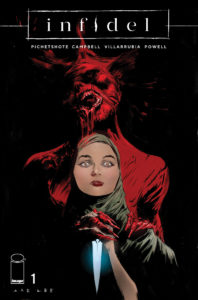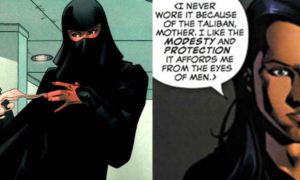
The ‘Good Muslims’ of Mainstream Comics
Article by Jim Allegro

Arguments about the inclusion of more diversity in comic books often turn on a shallow query: should we or shouldn’t we? But Infidel, Image’s new horror book, poses a more sophisticated question: how do comics assimilate diverse cultures and faiths such as Islam into the mainstream? Released last week, Infidel #2 finds an answer through Aisha, who fights to keep her faith against the pressures, corporeal and supernatural, of xenophobia. Her struggle will come at a cost, though, as it will for other recent Muslim additions to the comic universe. A survey of these characters says as much about the demands we make of immigrant families as it does about the industry’s latest display of openness toward difference.
Keeping Culture
Aisha is not a superhero, but she does share with Simon Baz, Kamala Khan, Monet St. Croix, and others the burden of discrimination. Baz, a Lebanese-American Muslim, is humiliated at airports and joins the Green Lantern Corps after his family suffers post-9/11 persecution. Born in Bosnia, M (St. Croix) is a member of X-Corps, and the X-Men, who must defend her faith from protesters who insist that Muslims are as bad as mutants. Sergeant Shahara Hasan, of Vertigo’s Bodies, suffers discrimination from her colleagues and worries for her family’s safety as she investigates a murder. The Pakistani-American Aisha struggles against the xenophobia of her boyfriend’s mother while fending off ghosts that haunt her dreams and her apartment, in a New York building once suspected of housing an Islamic extremist.

Such characters valiantly maintain their Muslim identities in the face of these obstacles. Comic books have become quite adept at signaling tolerance for the paraphernalia of Islam. Aisha and Hasan wear headscarves. Aisha prays, and eschews pork, as does the Pakistani-American Khan, who avoids alcohol, celebrates Eid, and stitches her Ms. Marvel costume out her mother’s burkini. Born in Afghanistan, the mutant and X-Men member Sooraya Qadir, a.k.a. Dust, wears a full burka with a niqab that covers her face. Baz challenges religious convention by donning a forearm tattoo with the Arabic word for courage.
Testing Loyalty
But these assertions of identity are not free. We make demands of Muslims that we would not make of other characters. Comic creators still mold these heroes around the ‘Good Muslim’ archetype, that is, they make clear they are faithful to certain western causes and alliances. Baz undergoes a loyalty test of sorts to prove his support for America’s war on terror. Falsely accused of plotting an act of terror, Baz must serve the Corps, and fight the Third Army, before the charges are dropped and the Justice League can accept him as a member. He thus enters the superhero pantheon only after making clear that he is not an extremist. The French-Algerian vigilante, Nightrunner, appeals to Batman, and America, because he refuses to take the side of the French Muslim community as the Paris suburbs erupt in racial violence.
Still others must show their loyalty to western culture and mores. Why are Kamala Khan and Aisha fans of superheroes and Star Wars and not of South Asian movies or pop music? It is as if we must strip them of every other aspect of their foreignness before they can wear a hijab and read the Koran. This process of deracination even extends to familial relationships. I have yet to see a well-adjusted Muslim family in a mainstream comic book. Aisha does not get along with her family because they reject her non-Muslim white boyfriend. Ms. Marvel suffers the trope of the conservative and overbearing Muslim brother who monitors his sisters’ personal and amorous choices. M’s brother, Empath, literally feeds on her.
Rescue Fantasies
We might defend some of these choices on the grounds that they are also challenges to patriarchy. But, if so, we cannot let these critiques become rescue fantasies, i.e., allegories of the benevolent westerner who ‘saves’ the oppressed brown  woman. Dust is rescued by a white man, on the run from slave traders in Afghanistan when Wolverine finds her. Such narratives amount to facile criticisms of Muslim men that in turn require Muslim women they look elsewhere for love. Hence, Muslim women such as Aisha and Khan must have white boyfriends. That way, we as westerners can monitor their personal choices. Or, maybe not. But I’ll know we will have reached parity on Islam when the hero of Infidel gets along with her family, loves whomever she wants, and does not have to prove her loyalty.
woman. Dust is rescued by a white man, on the run from slave traders in Afghanistan when Wolverine finds her. Such narratives amount to facile criticisms of Muslim men that in turn require Muslim women they look elsewhere for love. Hence, Muslim women such as Aisha and Khan must have white boyfriends. That way, we as westerners can monitor their personal choices. Or, maybe not. But I’ll know we will have reached parity on Islam when the hero of Infidel gets along with her family, loves whomever she wants, and does not have to prove her loyalty.

![[REVIEW] ‘THE HOT ZONE’ SHOWS A KILLER SO SMALL YOU CAN’T SEE IT WITHOUT A MICROSCOPE](https://geekd-out.com/wp-content/uploads/2019/06/thz_feature_image1-150x150.jpg)
![[OPINION] ‘DISTRAINT’ IS MORE TERRIFYING THAN ANY HORROR GAME BECAUSE IT MAKES ME SCARED OF MYSELF](https://geekd-out.com/wp-content/uploads/2019/10/distraint1-150x150.jpg)
